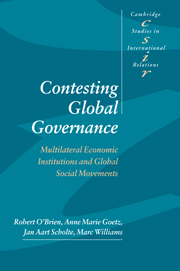Book contents
- Frontmatter
- Contents
- Preface
- List of abbreviations
- 1 Contesting global governance: multilateralism and global social movements
- 2 The World Bank and women's movements
- 3 The World Trade Organization and labour
- 4 The World Bank, the World Trade Organization and the environmental social movement
- 5 The International Monetary Fund and social movements
- 6 Complex multilateralism: MEIs and GSMs
- References
- Index
- CAMBRIDGE STUDIES IN INTERNATIONAL RELATIONS
1 - Contesting global governance: multilateralism and global social movements
Published online by Cambridge University Press: 22 September 2009
- Frontmatter
- Contents
- Preface
- List of abbreviations
- 1 Contesting global governance: multilateralism and global social movements
- 2 The World Bank and women's movements
- 3 The World Trade Organization and labour
- 4 The World Bank, the World Trade Organization and the environmental social movement
- 5 The International Monetary Fund and social movements
- 6 Complex multilateralism: MEIs and GSMs
- References
- Index
- CAMBRIDGE STUDIES IN INTERNATIONAL RELATIONS
Summary
In May 1998 a crowd swarmed through Geneva attacking McDonald's restaurants and vandalising expensive hotels as part of their protest against the World Trade Organization (WTO). In preparation for the same WTO meeting a global peasant alliance cemented relations and declared their opposition to the goal of trade liberalisation. In Indonesia social unrest in response to subsidy cuts agreed between the government and the International Monetary Fund (IMF) contributed to the downfall of a government. In the same year the IMF was subject to fierce criticism for its handling of the East Asian debt crisis by Indonesian trade unionists and the prime minister of Malaysia. In South Korea unions engaged in strikes in order to combat IMF and World Bank restructuring prescriptions. The closing years of the twentieth century have been marked by increasing opposition to the operation of multilateral economic institutions.
Although the US scholarship ignores the distributional effect of international institutions, preferring to debate their theoretical relevance to the study of international relations (Martin and Simmons 1998), there is little doubt that for hundreds of millions of people institutions such as the IMF, World Bank and WTO matter a great deal. The terms of IMF structural adjustment programmes influence the life chances of people in developing countries, a World Bank decision to prioritise girls' education can open the possibility for personal and community development; and the ability of the WTO to balance environmental concerns with trade liberalisation may save or condemn an ecological system.
- Type
- Chapter
- Information
- Contesting Global GovernanceMultilateral Economic Institutions and Global Social Movements, pp. 1 - 23Publisher: Cambridge University PressPrint publication year: 2000
- 1
- Cited by



